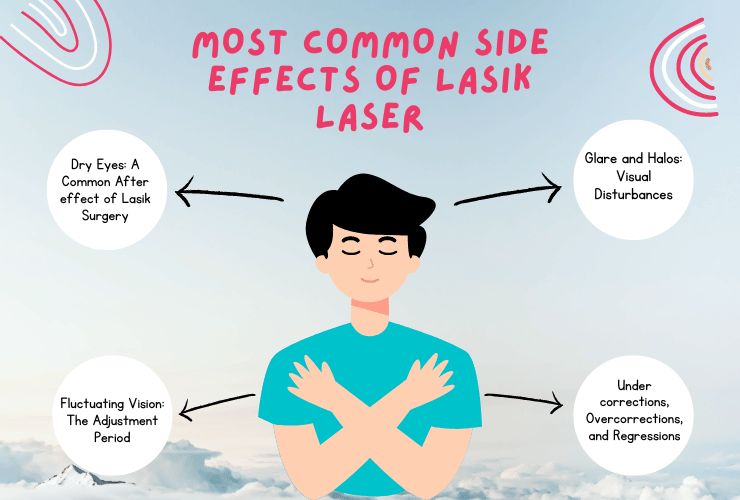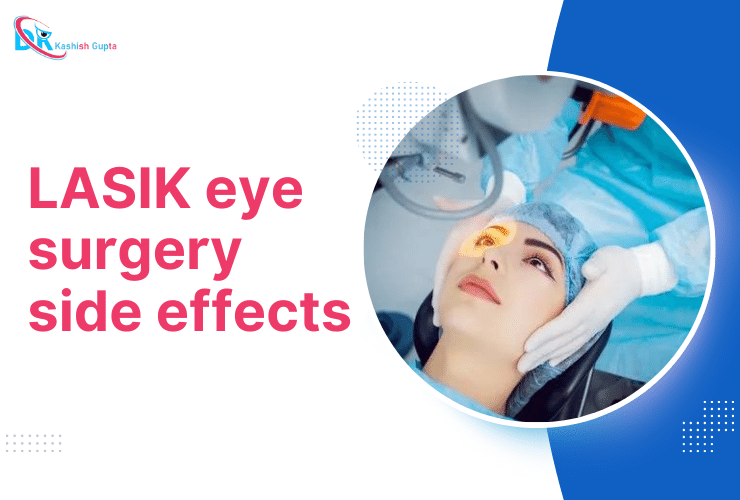With LASIK eye surgery, millions of people can have clear, unassisted vision without needing glasses or contact lenses. It is a shining example of modern medical science and a marvel in the domain of ophthalmology. While there are myriad success stories of LASIK results, knowing about the positive and negative repercussions of this life-changing operation is a must. To give a correct understating of LASIK eye surgery side effects, we contacted the best Lasik surgeon in Bathinda, Punjab, Dr Kashish Gupta, to share his expert opinion. The goal of this article on LASIK eye surgery side effects is that you can make an informed choice if you consider, at some point, reducing your dependence on eyeglasses.
The most common Side Effects of LASIK Laser

- Dry Eyes: A Common Aftereffect of Lasik Surgery
Dry eyes are one of the most common side effects following LASIK surgery. About half of individuals have this syndrome, which is often transient and peaks in the first few months following surgery. The LASIK procedure may interfere with the eye’s natural ability to produce tears, which could cause irritation, itching, or dryness. Even though these are usually transient problems, patients should talk to their eye surgeons about ways to manage their discomfort in the interim, like using lubricating eye drops or other treatments.
- Glare and Halos: Visual Disturbances
Halos & glare around lights are another potential side effect that some patients notice, especially at night. These vision problems can make it harder to drive at night and see when there isn’t much light. Even though these symptoms usually get better on their own over a few weeks to months, they show how important it is to get a complete pre-surgery exam to figure out the risk based on each person’s unique eye features.
- Fluctuating Vision: The Adjustment Period
LASIK surgery patients may notice changes in their vision in the weeks after the surgery. As the eye gets used to its new shape, this is a normal part of the healing process. Vision usually gets better after a few months, but during this time, patients may experience changes in how clear their vision is. This is why they need to be patient and keep seeing their eye doctor.
- Under corrections, Overcorrections, and Regressions
Even though it is a rare occurrence, your LASIK surgery may always result in perfect vision correction on the first attempt. Overcorrections happen when too much tissue is removed from the eye by the laser, and under corrections happen when too little tissue is removed. Regression is another possibility for certain LASIK patients, in which case their vision gradually returns to the original prescription. Although these problems are rare, they may be resolved with extra care, advanced technology, or improvements based on the particular situation.
Long-Term Considerations: Rare but Serious Risks
While LASIK is safe for most people, there are rare, more severe complications that can arise. These include infection, inflammation, and issues with the LASIK flap that can lead to further vision problems. Selecting a highly experienced surgeon and following all pre-and post-operative care instructions meticulously can significantly reduce these risks.
Selection of suitable candidates is vital in the prevention of side effects of LASIK eye surgery.
Deciding to undergo LASIK surgery is an important decision that you and your surgeon must thoughtfully reach. Knowing well about the possible side effects and discussing them openly with your eye care professional are crucial steps in the journey. A detailed examination and a frank discussion about your medical history, lifestyle, and expectations can help tailor the procedure to your needs, minimizing risks and enhancing outcomes.
Blog Summary: LASIK eye surgery side effects
If you want to fix your vision, LASIK is a very popular choice around the world. However, there are certain side effects that can happen after having LASIK surgery. A good surgeon can anticipate LASIK eye surgery side effects by making a correct diagnosis of the patient’s vision parameters & eligibility for the procedure. “With the right candidacy, & correct case assessment, most of the potential side effects could be averted or managed seamlessly,” says Dr Kashish Gupta, Best eye hospital in Bathinda, Punjab. Patients are able to navigate the decision-making process with confidence. They are ready to welcome a clearer future with informed optimism when they are equipped with this knowledge and guided by the expertise of trustworthy medical professionals.

